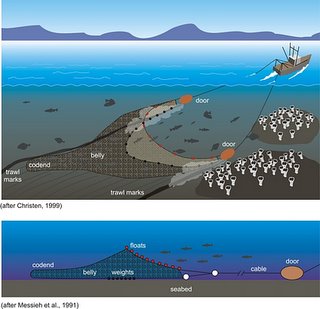
Ever wonder why the Canadian government keeps saying it's impossible to meet our international commitments to cut greenhouse gases under the Kyoto accord?
The truth is Canada’s ability to comply with Kyoto was quietly killed on December 18, 2002 - just one day after our ratification papers for the global climate treaty were proudly presented to the United Nations.
This shocking betrayal came in the form of a personal letter from then Minister of Natural Resources Herb Dhaliwal to the Canadian Association of Petroleum Producers. It guaranteed such sweeping concessions to the oil and gas sector that complying with Kyoto was virtually impossible without shutting down large sectors of the rest of the economy.
Among other things, Ottawa committed to the fossil fuel sector that they would “set emission intensity targets for the oil and gas sector at no more than 15% below the projected business-as-usual levels for 2010.”
Industrial emitters like the oil sector account for over 50% of all greenhouse gas emissions in Canada. This quiet corporate give-away meant that the rest of the Canadian economy, namely you and me, would have to cut our emissions by more 40% - assuming we want to comply with international law.
Meanwhile, the oil and gas industry has cheerfully increased their emissions by 47% since 1990, and they are set to double again in the next decade.
But wait, there's more. This letter also committed that the oil industry would pay no more than $15/tonne for greenhouse gas offsets until 2012. What a bargain! A study conducted for the National Climate Change Process estimated the true costs of such offsets are more like $250/tonne.
Given these sweeping concessions to the fossil fuel lobby, complying with Kyoto is now virtually impossible. For instance, we could shut down the entire transportation sector in Canada (a mere 25% of all emissions) and still not meet our Kyoto commitments.
This also creates the convenient situation where those pundits who appose any meaningful movement on climate policy can crow that Kyoto is not doable and never was.
Realistically, the likelihood of Stephen Harper, an Alberta Tory, reneging on this remarkable sellout to the oil industry is vanishingly small. The reason this deal was was so crucial to the oil sector is because the Alberta oil sands development produces such astronomical carbon emissions.
So energy intensive is this bitumen boondoggle, it takes up to 1,500 cubic feet of clean natural gas to produce one barrel of dirty crude. The oil sands now consume 600 million cubic feet of natural gas per day – enough to heat 3.2 million Canadian homes.
The gluttonous appetite of the tar sands for dwindling natural gas supplies is expected to more than triple by 2012.
 Hence the need for the proposed 1,200 km Mackenzie Valley gas pipeline from the Artic Ocean to Fort McMurray, at a cost of $7.5 billion.
Hence the need for the proposed 1,200 km Mackenzie Valley gas pipeline from the Artic Ocean to Fort McMurray, at a cost of $7.5 billion. Besides the fact that this outrageously inefficient project creates three times the carbon emissions of conventional oil development, why would it even make economic sense to convert our finite deposits of natural gas into oil? From an energy efficiency point of view, we are turning caviar into Kraft dinner.
The simple answer is that China needs oil to fuel their ballooning love affair with the automobile. There is only so much oil in the world and politicians are falling all over themselves to sell it, even as they publicly spout platitudes about climate change.
``So when Harper rolls out his “Made in Canada” strategy, don’t expect much. We will likely see the usual tough talk minus any deadlines. More cynically, the government spin-doctors will also attempt to deflect attention away from inaction on climate change by talking instead about smog.
This hoary tactic of attempting to confuse the public by talking about smog and greenhouse gases interchangeably is typically reserved for only the most desperate PR situations. That time is now.
If there is a bright side, it’s that this is what early childhood educators would call “a learning moment”. The planet’s life support systems do not fail all at once, or even gradually over time. Our environment is degraded incrementally – bad decision by bad decision. It is important to take note of such milestones. This one happens to be a doosey.
In their pedantic and qualified way, the world’s leading scientists are telling us that climate change is the nothing short of a hair-on-fire planetary emergency. The most recent study was presented last week by James Hansen of NASA's Goddard Institute for Space Studies, showing the Earth has not been this warm in the last 12,000 years.
"If further global warming reaches 2 or 3 degrees Celsius, we will likely see changes that make Earth a different planet than the one we know. The last time it was that warm was in the middle Pliocene, about 3 million years ago, when sea level was estimated to have been about 25 meters (80 feet) higher than today," Hansen said.
Assuming we want to avoid that outcome, there are some practical options. While the Canadian oil and gas lobby has been spectacularly successful at bullying our government, their counterparts elsewhere in the world have taken a very different tack.
For instance, British Petroleum in the UK committed in 1998 to reducing greenhouse gas emissions 10% below 1990 levels by 2010 – a target they reached in 2003, seven years ahead of schedule. Thirteen major UK companies including PB and Shell also penned an open letter to Tony Blair urging clear and strong regulation of greenhouse gases, and a long term plan that would further reduce emissions by 60% below 1990 levels by 2050.
Another case in point is California, with a population similar to Canada. Many of us cringed when the “Terminator” became Governor, but Schwarzenegger last month signed a landmark deal that would reduce greenhouse gas emissions by 25% by 2020, making California the first US state to legislate a cap on emissions.
Regulation of greenhouse gases will come sooner or later, whether industry likes it or not. Business leaders in other countries have taken the long view that it is better to volunteer than be drafted. Governments elsewhere have provided clear goalposts to those industries and got on with the business of governing.
Ottawa can step back from our emerging image as a global climate pariah, and take a leadership role on creating a sustainable future. However, the first step must be to tear up the sweetheart deal with the oil industry.
Mitchell Anderosn is a freelance writer living in Vancouver. A related piece ran on the Tyee on October 4, 2006










































